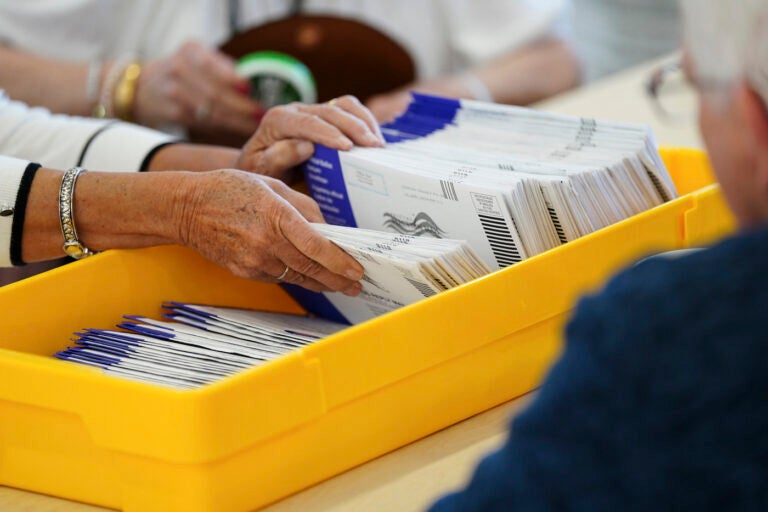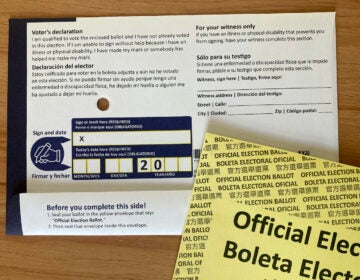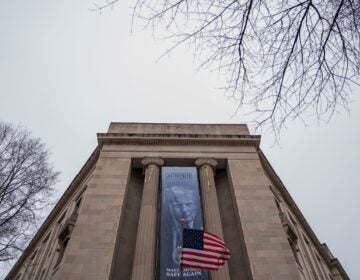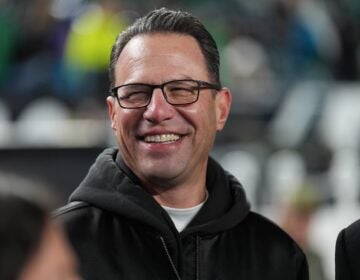How 9 mistakenly discarded ballots in Luzerne County, Pa., fueled Trump’s 2020 lies about elections
An investigation by the Justice Department’s internal watchdog criticizes DOJ leaders for their statements about Pennsylvania ballots during the 2020 campaign.

Workers sort mail-in ballots April 23, 2024, at Northampton County Courthouse in Easton, Northampton County, Pennsylvania. (Matt Smith / For Spotlight PA)
This story originally appeared on Spotlight PA.
A new report from the U.S. Department of Justice found that under the Trump administration, a U.S. attorney violated department policies while handling an investigation into nine Pennsylvania ballots that were mistakenly discarded in 2020.
The report, released Thursday by the Justice Department’s Office of the Inspector General, its internal watchdog, showed how these choices helped fuel then-President Donald Trump’s false narrative of a stolen election.
The ballots at the center of the nearly four-year-old case were from Luzerne County. The report examined how top DOJ officials handled and publicly released information from the FBI’s investigation into those ballots, including then-Attorney General William Barr’s decision to share details of the investigation with Trump while it was ongoing.
Trump’s reelection campaign seized on the investigation into the discarded Pennsylvania ballots as evidence that mail voting was being manipulated to steal the election from Trump.
However, the inspector general pointed out that the FBI found the real reason for the ballots’ handling was much more mundane: A “mentally impaired” seasonal worker had simply made a mistake.
The Justice Department has policies to prevent investigations from being politicized, especially during an election year. The inspector general’s report highlighted how breaches of these policies can snowball into false and exaggerated claims of election fraud, and recommended that DOJ make changes to clarify which information can be included in public statements.
Handling this kind of sensitive election information is something that Al Schmidt, Pennsylvania’s top election official, has thought a lot about.
“These types of minor clerical errors in election administration can be misused by bad-faith actors to undermine confidence in our electoral process,” Schmidt said in a statement Friday. “Election administration is highly scrutinized, and any error — no matter how inadvertent, no matter how minor — will be used by those seeking to undermine confidence in election results and our representative democracy.”
Seven ballots cast for Trump appear in the trash
The case dates back to Sept. 16, 2020, when then-Luzerne County Election Director Shelby Watchilla discovered that one of her temporary election workers had mistakenly put nine military absentee mail ballots in the trash, according to Politico reporting at the time.
Watchilla reported the incident to supervisors, and two days later the Luzerne County district attorney notified the FBI that a county elections employee had discarded seven military absentee ballots — which had been taken out of their envelopes, revealing votes cast for Trump — in a dumpster. Two still-sealed envelopes that the employee had “mishandled” were also provided to the FBI, according to the report.
The FBI took over the investigation on Sept. 21. The next day, the Luzerne County district attorney issued a press release about the incident and federal authorities’ role in investigating it.
According to the inspector general’s report, Barr briefed Trump on the incident on Sept. 23, and informed him that the ballots had been voted for him — information that was not public at the time. Trump went on to repeat that claim on a Fox Radio show the next morning.
The next day, Sept. 24, David Freed, who was overseeing the investigation as U.S. Attorney for the Middle District of Pennsylvania, released his own statement that incorrectly said all nine ballots had been cast for Trump. A corrected version said only seven had been cast for Trump, while the votes of the two unopened ballots were unknown.
The Trump campaign and its allies quickly began weaving the incident into a narrative about election fraud, which ultimately escalated to the Jan. 6, 2021, riot by Trump followers at the U.S. Capitol. Some examples:
- Matt Wolking, a Trump campaign official, tweeted on Sept. 24 that “Democrats are trying to steal the election,” and repeated Freed’s erroneous statement that all nine mishandled ballots had been cast for Trump.
- Trump mentioned the incident twice at the first presidential debate to back his claim that the election was “going to be a fraud like you’ve never seen.”
- On the stump, Trump inflated his claim at one point to say “thousands of ballots” with votes for him were “dumped in dumpsters.”
- Conservative activist Dan Carr said on Facebook the incident was “true election interference,” USA Today reported.
- Campaign surrogate Eric Trump, the president’s son, alluded to the Luzerne case the day after the election as an indicator of Democratic cheating, saying “we’ve seen it from Day 1.”
Justice Department knew more than it let on
Even as Barr was informing Trump of the incident on Sept. 23, and Freed was drafting his statement, the Justice Department knew crucial information about the incident that it kept from the public, allowing misinformation about the case to go unchallenged.
The FBI had interviewed the temporary election worker on Sept. 22, and determined that he had “memory problems” and was “100% disabled” due to a “vehicle accident in 20s w[ith] brain injury,” the inspector general’s report said. The FBI also noted in an internal Sept. 23 email that the worker was “not capable of following simple instructions” and was assigned “menial tasks.”
Part of the problem, according to the report, was that return envelopes for military ballots were being mistaken for envelopes containing mail ballot request forms, so Luzerne election workers were opening both, even though ballot envelopes are not to be opened until Election Day. The envelopes containing ballots were not clearly marked, the Pennsylvania Department of State said at the time. Training for workers was increased after the incident, and in a statement this week, Schmidt highlighted a new training program for election directors launched last year.
Prior to issuing his Sept. 24 statement, Freed also told Barr he was “not sure” that the investigation was “going to result in a criminal charge.”
“Indeed, the Department determined before Election Day that no charges would be brought in the matter, although it failed to inform the public of that fact until well after the election,” the report said. It wasn’t until Jan. 15, 2021, that Freed’s successor announced publicly that no charges would be filed.
Report says Freed’s conduct violated some policies
The Justice Department has internal rules and policies on how federal investigators should handle and release details from an investigation, including “a longstanding policy prohibiting Department employees from commenting publicly about ongoing, uncharged investigations,” the report states.
The report focused on determining whether Freed’s public statements and Barr’s involvement in them, as well as Barr’s conversation with Trump, ran afoul of those policies.
The report said Freed’s statements “raised questions” about whether departmental policy had been violated, and about the motivations for releasing those statements during an election cycle, in particular because the statements specified the “name of a candidate for whom the votes were cast on the discarded ballots.”
The policy, the Election Year Sensitivities Memorandum, tells department employees they can “never select the timing of public statements (attributed or not) … in any matter or case for the purpose of affecting any election, or for the purpose of giving an advantage or disadvantage to any candidate or political party.” The policy is meant to safeguard “the Department’s reputation for fairness, neutrality, and non-partisanship,” the report states.
Ultimately, the inspector general’s report concluded that Freed’s actions violated some DOJ policies, but that Freed and Barr hadn’t committed misconduct, because of ambiguities in the attorney general’s authority to approve the release of statements. The report also said while the inspector general was “troubled” by Barr’s relaying of details about the investigation to Trump, it was not a policy violation.
The inspector general said it was referring the matter to the U.S. Office of Special Counsel for investigation into possible violations of the Hatch Act, which prohibits executive branch employees from using their “official authority or influence for the purpose of interfering with or affecting the results of an election.”
Freed, whom Trump nominated as a U.S. attorney in 2017, denied to investigators that he acted with any political motivation.
Incident highlights dangers of misinformation
Claire Wardle, associate professor at Cornell University who studies misinformation and disinformation, said incidents like the one in Luzerne are not uncommon, since elections are often run by volunteers or those working for little pay. But in today’s partisan environment, the “messiness” of this process has been reframed through people’s biases about elections.
“Whereas before some of those human mistakes didn’t make the news, now we see what is a very natural part of democracy getting twisted,” she said. “In almost every single case it gets sorted, but the problem we have now is that people take photos and weaponize it to say ‘look, the system can’t be trusted.’”
Wardle said that this year, news organizations should put out stories about how the system works and issues that may occur before they happen, not after. Individuals should also think carefully about what they share on social media before they have all the facts, she said, since it can take months for a proper investigation to determine what actually happened.
“America is in a really dangerous place right now because people don’t trust the system… and the country will collapse if there’s not trust in the system,” she said.

Get daily updates from WHYY News!
WHYY is your source for fact-based, in-depth journalism and information. As a nonprofit organization, we rely on financial support from readers like you. Please give today.





